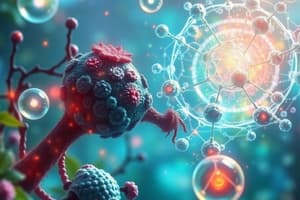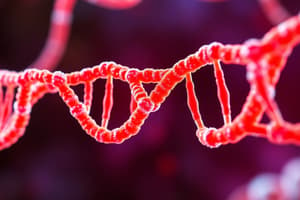Podcast
Questions and Answers
जीवविज्ञान की प्रमुख शाखाओं में से कौन-सी है?
जीवविज्ञान की प्रमुख शाखाओं में से कौन-सी है?
- खेमा विज्ञान
- सामाजिक विज्ञान
- भौतिकी (correct)
- जूलॉजी
रासायनिक प्रतिक्रियाएँ क्या करती हैं?
रासायनिक प्रतिक्रियाएँ क्या करती हैं?
- केवल ठोसों के साथ होती हैं
- पदार्थों के संघटन में बदलाव लाती हैं (correct)
- किसी पदार्थ के गुणों को नहीं बदलती
- सिर्फ तापमान को नियंत्रित करती हैं
भौतिकी में किस सिद्धांत का अध्ययन होता है?
भौतिकी में किस सिद्धांत का अध्ययन होता है?
- अवशोषण
- मैकेनिक्स (correct)
- संवर्धन
- पारिस्थितिकी
हिंदी भाषा का लिपि कौन-सी है?
हिंदी भाषा का लिपि कौन-सी है?
रसायन विज्ञान में पदार्थों की अवस्थाएँ कौन-सी हैं?
रसायन विज्ञान में पदार्थों की अवस्थाएँ कौन-सी हैं?
सजीवों और उनकी पर्यावरण के बीच के अंतःक्रियाओं का अध्ययन किस क्षेत्र में होता है?
सजीवों और उनकी पर्यावरण के बीच के अंतःक्रियाओं का अध्ययन किस क्षेत्र में होता है?
भौतिकी में ऊर्जा के परिवर्तन का अध्ययन किस सिद्धांत में होता है?
भौतिकी में ऊर्जा के परिवर्तन का अध्ययन किस सिद्धांत में होता है?
हिंदी भाषा का एक महत्वपूर्ण शब्दावली स्रोत कौन-सा है?
हिंदी भाषा का एक महत्वपूर्ण शब्दावली स्रोत कौन-सा है?
Flashcards
जीव विज्ञान (Biology)
जीव विज्ञान (Biology)
जीवन और जीवों के अध्ययन की शाखा, जिसमें उनकी संरचना, कार्य, वृद्धि, उत्पत्ति, विकास और वितरण शामिल है।
रासायनिक अभिक्रियाएँ (Chemical Reactions)
रासायनिक अभिक्रियाएँ (Chemical Reactions)
पदार्थों की संरचना में परिवर्तन।
भौतिकी (Physics)
भौतिकी (Physics)
पदार्थ, ऊर्जा और उनके पारस्परिक क्रियाओं का अध्ययन।
कोशिका सिद्धांत (Cell Theory)
कोशिका सिद्धांत (Cell Theory)
Signup and view all the flashcards
विकास (Evolution)
विकास (Evolution)
Signup and view all the flashcards
रासायनिक तत्व (Elements)
रासायनिक तत्व (Elements)
Signup and view all the flashcards
हिन्दी भाषा (Hindi Language)
हिन्दी भाषा (Hindi Language)
Signup and view all the flashcards
अंग्रेजी भाषा (English Language)
अंग्रेजी भाषा (English Language)
Signup and view all the flashcards
Study Notes
Biology
- Biology is the study of life and living organisms, including their structure, function, growth, origin, evolution, and distribution.
- Key branches include botany (plants), zoology (animals), microbiology (microorganisms), and genetics.
- Biological processes such as metabolism, reproduction, and adaptation are fundamental to understanding life.
- Cell theory describes the cell as the basic unit of life, with various cellular processes like respiration and photosynthesis.
- Ecology studies the interactions between organisms and their environment.
- Evolution is a fundamental concept, explaining the descent with modification of species over time.
Chemistry
- Chemistry is the study of matter, its properties, structure, composition, behavior, and the changes it undergoes.
- Key concepts include atoms, molecules, elements, and compounds.
- Chemical reactions involve changes in the composition of substances.
- States of matter (solid, liquid, gas) and phase transitions are important concepts.
- Periodic table organizes elements based on their properties.
- Bonding (ionic, covalent, metallic) explains how atoms combine.
- Thermodynamics studies energy changes in chemical reactions.
Physics
- Physics is the study of matter, energy, and their interactions.
- Fundamental forces of nature include gravity, electromagnetism, the strong and weak nuclear forces.
- Mechanics studies motion, forces, and energy.
- Thermodynamics studies heat and temperature.
- Electricity and magnetism are closely related phenomena.
- Optics studies light and its behavior.
- Modern physics covers areas like relativity and quantum mechanics.
Hindi
- Hindi is an Indo-Aryan language, part of the larger Indo-European language family.
- It is widely spoken in India and Nepal.
- The Devanagari script is used to write Hindi.
- Hindi has a rich literary tradition, with a vast body of poetry, prose, and drama.
- It has a significant vocabulary derived from Sanskrit and other languages.
- Formal and informal dialects exist within the language.
- Learning Hindi involves understanding grammar, vocabulary, and pronunciation rules.
- It is a valuable language for communication in India.
English
- English is a West Germanic language that originated in England.
- It is now a global language, spoken by a large number of people worldwide.
- English has a complex grammar system, with different tenses, aspects, and grammatical structures.
- It has a vast vocabulary derived from various sources, including Latin, French, and other languages.
- English uses a variety of writing styles, including formal, informal, and technical.
- English is an important tool for communication and understanding in international settings.
- Proficiency in English involves understanding grammar, vocabulary, pronunciation, and writing skills.
Studying That Suits You
Use AI to generate personalized quizzes and flashcards to suit your learning preferences.
Description
यह प्रश्नोत्तरी जीव विज्ञान और रसायन विज्ञान के मूलभूत सिद्धांतों का पालन करती है। इसमें जीवों का अध्ययन, उनके प्रक्रियाएं, तथा रासायनिक तत्वों और प्रतिक्रियाओं से जुड़ी जानकारी शामिल है। इसे जीने की मूल बातें समझने में मदद करने के लिए डिज़ाइन किया गया है।




